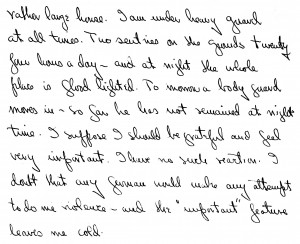By the middle of May, the Justices were presiding over the defense, cross-examinations and review of documents associated with the cases of Doenitz, Funk, Raeder and Schirach. Jackson was in London and Paris and Dodd was managing the now routine tasks of keeping the trial progressing. Intermittent violence surfaced more regularly, although Dodd does not explain the justifications that may have been circulating around the city as soldiers were killed by unknown assailants. The reaction of the U.S. Army was immediate and personal. Interspersed with a comment regarding his recent birthday (May 15), reviewing documents offered by the Schirach defense and ![]()
going to the barber, Tom writes, “It is very lonesome for me all alone in this rather large house. I am under heavy guard at all times. Two sentries on the grounds twenty-four hours a day–and at night the whole place is flood lighted. Tomorrow a bodyguard moves in…I suppose I should be grateful and feel very important. I have no such reaction.” [p. 305, 5/19/1946] He does not believe he is important or significant enough to be targeted by those who continued to fight for a defeated cause. Feeling insignificant and far from all he holds dear, Tom Dodd is very lonely in a destroyed city, surrounded by thousands.
–Owen Doremus and Betsy Pittman
[Owen Doremus, a junior at Edwin O. Smith High School, is supporting this blog series with research and writing as part of an independent study.]
The majority of the letters from Tom Dodd to his wife Grace have been published and can be found in Letters from Nuremberg, My father’s narrative of a quest for justice. Senator Christopher J. Dodd with Lary Bloom. New York: Crown Publishing, 2007.
Images available in Thomas J. Dodd Papers.

